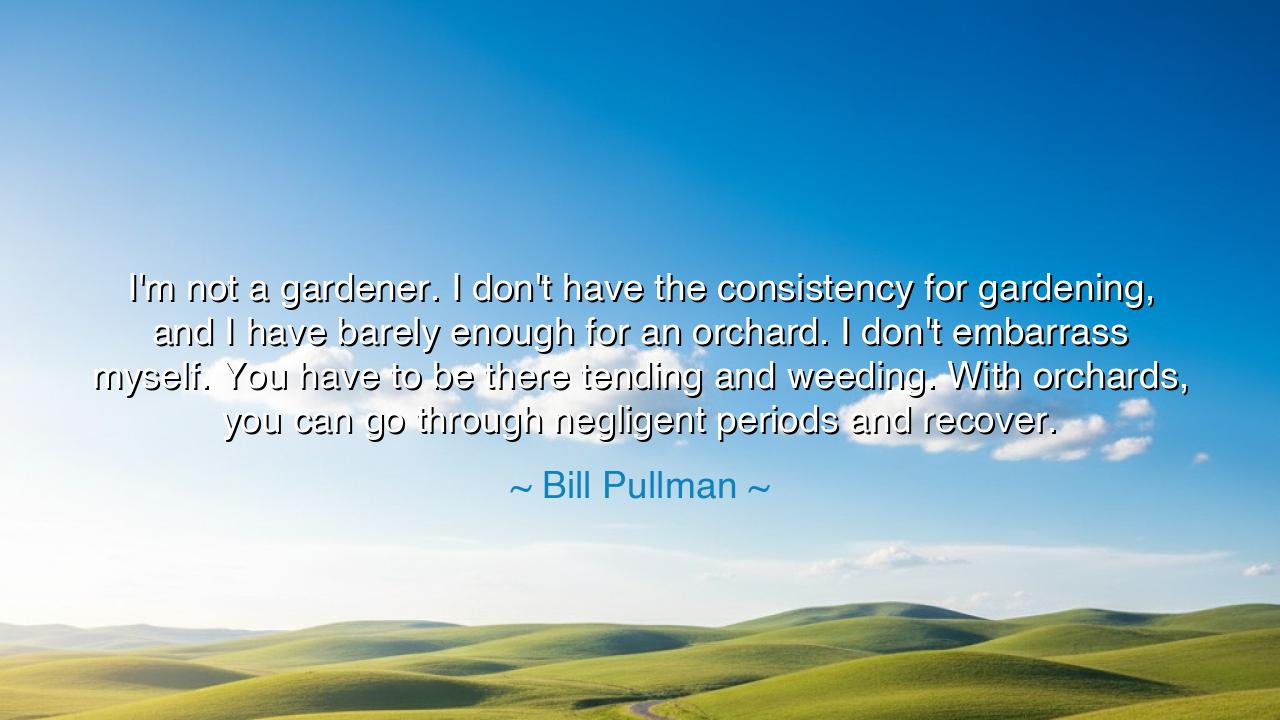
I'm not a gardener. I don't have the consistency for gardening
I'm not a gardener. I don't have the consistency for gardening, and I have barely enough for an orchard. I don't embarrass myself. You have to be there tending and weeding. With orchards, you can go through negligent periods and recover.






The words “I’m not a gardener. I don’t have the consistency for gardening, and I have barely enough for an orchard. I don’t embarrass myself. You have to be there tending and weeding. With orchards, you can go through negligent periods and recover.” were spoken by Bill Pullman, the actor and farmer, a man who walks between the worlds of art and earth. Beneath their humble humor lies a profound understanding of human limitation, patience, and renewal. It is a statement about the rhythm of life itself — how different endeavors demand different forms of care, and how wisdom comes not from perfection, but from knowing one’s own nature. Pullman’s orchard becomes a living metaphor for a life of balance, acceptance, and resilience.
When Pullman admits, “I’m not a gardener,” he speaks for all who have discovered that not every calling suits their temperament. The gardener must be meticulous — consistent in watering, pruning, and protecting each fragile bloom from neglect. This requires a constancy that few can maintain in the chaos of modern living. The gardener’s work is immediate; its rewards and failures come swiftly. But the orchard — the slower, steadier domain of trees — teaches a different wisdom. It allows for seasons of neglect, trusting that the deep roots will sustain life until care returns. In this, Pullman honors a truth that touches every soul: life cannot always be perfectly tended, yet forgiveness and renewal are woven into the design of time.
In calling himself “barely consistent enough for an orchard,” Pullman reveals the humility of the self-aware. He recognizes that endurance, not control, defines a fruitful life. The orchard symbolizes a slower, more forgiving process — one where growth continues even when attention wavers. Trees, once planted, root themselves in faith. They endure storms, droughts, and seasons of stillness. They do not demand constant presence, but they do demand trust. Thus, in his words, Pullman reminds us that life’s great works are not built in constant vigilance alone, but in faith sustained through imperfection. The orchard forgives what the garden does not, just as time often forgives what effort alone cannot repair.
There is a wisdom in this contrast that has echoed since the days of old. Consider the farmer and philosopher Wendell Berry, who wrote, “The care of the earth is our most ancient and most worthy responsibility.” Berry, like Pullman, understood that tending to life — whether land, art, or relationships — is not an act of domination but of partnership. There are moments of diligence, yes, but also moments of rest, of stepping back and allowing nature to heal itself. In this rhythm between effort and surrender lies the heart of endurance. The orchard, then, is not just a field of trees — it is a mirror of the human soul, capable of weathering neglect and yet yielding sweetness again.
This reflection also carries a deeper moral lesson about forgiveness and recovery. In our lives, we are not always constant. We fail in our commitments, lose focus, and let our own inner gardens grow wild. Yet if we have built strong roots — in love, in faith, in purpose — we can, like the orchard, recover from seasons of neglect. The gardener’s precision may be ideal, but the orchardist’s endurance is divine. Pullman’s wisdom lies in his acceptance of this imperfection — in his refusal to despair over inconsistency, and his gratitude for the resilience that nature provides. He sees that life does not require flawless tending, only honest return.
Moreover, his humility — “I don’t embarrass myself” — is not pride, but peace. It speaks of a man who has made peace with his pace, who measures success not by relentless achievement but by quiet perseverance. The orchard grows as he grows — imperfectly, patiently, and yet faithfully. There is a kind of holiness in that balance. For in every life there must be both gardens and orchards: some things that demand daily attention, and others that can be left to mature in the slow patience of time.
The lesson of Pullman’s words is one of gentleness — toward ourselves, toward others, and toward the process of growth. Not every part of life can be manicured like a garden. Some parts, like the orchard, must be trusted to grow beyond our control. What matters is not constant perfection, but the courage to return — to tend again after neglect, to begin again after silence, to nurture what still lives beneath the surface.
Practical actions: Know the kind of work your soul can sustain. Tend to what requires daily care — your relationships, your integrity, your heart. But also plant orchards in your life — long-term hopes and dreams that can endure your absences. When fatigue comes, rest; when neglect happens, return. For as Bill Pullman reminds us, life’s beauty lies not in the flawless tending of every garden, but in the quiet faith that, like the orchard, we can recover — and bear fruit again.






AAdministratorAdministrator
Welcome, honored guests. Please leave a comment, we will respond soon